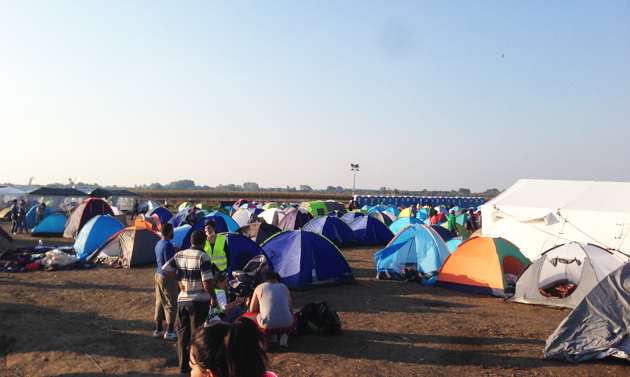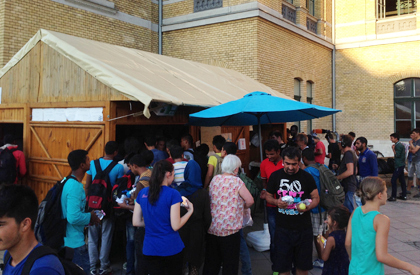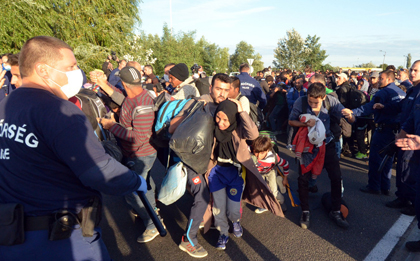Two evangelical pastors in Szeged share their views after borders are closed to refugees. The country “will need the church to help integrate and accept the refugees who stay”.
 The refugee camp in Roszke, before it was emptied this week. / K. Eckhart
The refugee camp in Roszke, before it was emptied this week. / K. Eckhart
Hungary closed its borders to refugees on Tuesday 15 and will arrest any person that trying to enter the country illegally. But what has been happening in the last few days? What are the perspectives of Christians living in the country?
Two pastors of evangelical churches in Szeged (Hungary) told Evangelical Focus their impressions from what they have seen on the ground.
“The last few days had an increase in groups of refugees trying to avoid the police. We have seen people walking along the old motorway to Budapest; others being picked up by Police”, explains Andy Cheesman, pastor of a Pentecostal church in Szeged.
“On Sunday, there was a massive flux of people in the temporary holding area next to the Roszke train tracks next to the border. 2 am Monday morning, they started mass shipping of refugees in buses away from the city, by 10 am the site was 40 per cent full and by 5pm the site was a ghost town and helping organisations, churches and NGOs were packing up and working out how to relocate to the Serbian side”.
 A food collection point next to the Szeged train station. / K. Eckhart
A food collection point next to the Szeged train station. / K. Eckhart“Everyone is tired: migrants, the police and volunteers”, adds Kyle Eckhart, another pastor serving in Szeged and living in the country for 20 years now.
At times, tensions have emerged, because “civil groups have been helping and so much humanitarian aid has arrived that a lot has been wasted. Meaning, migrants get food, water, tents, and then as soon as they move they drop everything. That isn’t to say that they don't appreciate what their given”.
SEVERAL HUNGARIAN CHURCHES WORKING TIRELESSLY
Christians have not been alien to the situation. “We have collected money, bought food and essential items and donated to the train station collection site (where refugees were previously being moved on trains) and more recently directly to Roszke site”, Cheesman explains.
“Other churches have been living onsite working more than 18 hours distributing help and aid and providing temporary accommodation”.
But it has been “very hard and frustrating for the local churches”, especially for “the leaders, as limited resources mean that we all have one (or more) full-time job which has directly limited the opportunity to help”.
Eckhart adds: “We as a church (a small church) have been taking what we can, when we can, to a group of volunteers who have been doing a good job spearheading the efforts to help the migrants at the Szeged train station”.
Other denominations have also given abundantly: “When the migrant situation ‘blew up’ at the border many of the “national” churches (which have lots more manpower and resources) got involved in the crisis. They’ve set up tents, and their volunteers have distributed aid to the migrants”.
CITIZENS GETTING INVOLVED SUPPORTING REFUGEES
What has been the attitude of Hungarian citizens towards the refugees arriving? “Many Hungarians have been extremely generous with their time and money”, tells Andy Cheesman. “All refugees support has come from civil society as people have reached out to other humans.”
“The government has not directly been involved in helping, only in policing, securing the borders and transporting the refugees across the state. Police and Refugee behaviour has been exemplary”.
Andy, whose wife works as lecturer at the Szeged University, shares how “even international students, including medical students from the local university, have been helping particularly with translation.”
“MOST HUNGARIANS ARE TORN”
But not everyone is so positive. When it comes to how to handle the refugee crisis, many support Prime Mininister Victor Orban’s policies.
“I think most Hungarians are torn”, says Kyle, who teaches English at t bilingual high school. “I've talked with many in our church and also with people I work with. They are torn because they want to help because these migrants are people but on the other hand they are afraid of bad elements that might be coming through and that many of these people demand so much when they cross the border illegally”.
MEDIA REPORTS: ARE HUNGARIANS FAR RIGHT?
Echart thinks that international media “have done a very good job of painting Hungary and its government in a bad light”.
“Though I don’t agree with this current government on everything, I think that Hungary has been treated unfairly in regards to this crisis. All you hear about in the media is how the ‘far right wing’ government erected this fence along the border of Serbia”, he thinks.
“What you don’t hear about is how there are laws in the EU regarding refugees. The EU law states that a person seeking asylum must register in the country where they enter the EU”.
 Tensions emerged between refugees and the police. / Delmaghyar
Tensions emerged between refugees and the police. / DelmaghyarGreece, Eckhart argues, did not fulfill its duties. So, the “next stop is Hungary”. What the Hungarian government wants, according to Eckhart, “is for these people to seek asylum at international border crossings. The reason migrants don’t want to do this is because they think that they will have to stay in Hungary. So while I understand the migrants for wanting to leave their home countries to flee from war and seek a better life for their families, I also understand the Hungarian government for trying to protect its borders and the current EU laws”, Eckhart says.
Cheesman agrees in the fact that the Hungarian society is “very divided” on this issue.
But his view is slightly different. “Hungarians are poor but not as poor as they think they are. Part of the negative reaction is wondering how our limited resources will be spread around”.
It is also true, Cheesman says, that “the number of people coming is overwhelming - the number of refugee is equivalent to 1-2% of the national population and roughly equal to the population of Szeged! However, Hungary has suffered a mass economic migration to the west with large numbers leaving to go to Germany and England”.
HUNGARIAN MEDIA UNDER ORBAN’S INFLUENCE
What about the Hungarian broadcasters and newspapers? National media, thinks Cheesman “have only been focusing upon the hardline extremist views and been playing upon fear and lack of understanding”.
“The National media reports include titles that ‘This was the day that they shut out the refugees’. The majority of the national media is owned by the Fidesz government so any messages broadcast will espouse the message of Orban Victor.”
“There is a strong media presentation which correlates Islam, refugees and terrorism. This fuels fear, worry and hatred”, thinks Cheesman. “Most people read foreign media to get a real picture and perspective”.
AFTER TUESDAY, DEPORTATION OF MANY EXPECTED
Following Orban’s government policy the country will punish any refugees or migrants arriving to its borders after Tuesday 15 September.
“From a legal standpoint, what will happen from Tuesday is that anyone found to damage or cross the fence illegally with be imprisoned for up to 30 days”, explains Cheesman. “Special judges have been allocated to deal with these cases. It is a bit of a grey area as to whether the law abides by EU standards”.
“I think realistically they will be deported”, adds Eckhart. “Hungary has completely closed the border to Serbia so there is no going in or out as of right now. Hungary has, in the past days and weeks, tried to move refugees out of the country to the West”.
EVANGELICALS: “WORKING TOGETHER FOR COMMON GOALS”
Having seen the complexity of the situation, what should Christians do? “Firstly, working together for common goals”, says Cheesman. “There is a tendency for people and churches to work for themselves, showing how they are making the difference. It has been encouraging to see some groups have pooled resources and manpower”.
Christians should know how to “communicate this situation with work colleagues and family members. Hungary is a very mono-cultural place, it will need the church to help integrate and accept the refugees who stay into Hungarian culture”.
Eckhart agrees in the fact that “evangelical churches can be salt and light by working together, and continuing to give ‘a glass of cold water’ to those in need, in Jesus’ name”.
“The challenge is how we move on from here”, concludes Cheesman. “It is ok to do short-term work at the border when people move on quickly, but how will we respond to a call which lasts for years?”

Las opiniones vertidas por nuestros colaboradores se realizan a nivel personal, pudiendo coincidir o no con la postura de la dirección de Protestante Digital.
Si quieres comentar o